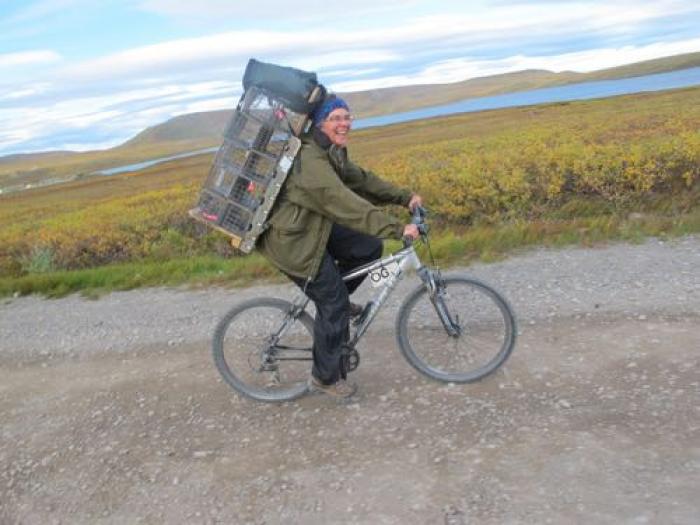Meet Team Squirrel - Jeanette Moore
You may remember Jeanette from orientation as the one who introduced me to my first arctic ground squirrel, though the squirrel may not remember, since it was still in hibernation.
Jeanette picked me up at noon and we headed out to lunch. She took me to a restaurant where we sat in a covered outdoor seating area, with a view of a river, and we both had salads. It was a good idea, as I slowly transition back to reality and healthy eating. Next stop was the reindeer farm on campus, and I saw a few pregnant reindeer as well as two moms and their baby reindeer that were happily snoozing away in the warm spring day.


Jeanette took me to the lab on campus where they keep the captive squirrels and where she does her research. It is a very clean facility, both for the sake of the researchers and the animals. We had to wear clean booties over our shoes and a jacket over our clothes. It was very bright in the hallways and she needed a key card to access the lab. She is done working with the squirrels this season, but she showed me the hibernation room and chambers, which are kept just above freezing to encourage the animals to go into hibernation, and to stay in hibernation. The animals have implants that monitor their body temperature, movement, heart rate, etc, and their chambers sit on top of plates that can read the data as it is collected. This allows them to collect a lot of data without disturbing the animals. She then showed me a graphical representation of some of the squirrels' body temperature data, and it showed how their body temperatures increase back to normal every two to three weeks for a short time when the animals start to rouse, and then decrease again when they go back into a deeper state of hibernation. The rooms where the animals are kept are very clean, and they also have a red light function. The ground squirrels cannot see red light, so the researchers can use it to see the squirrels without disturbing them.

Later, we stopped at a local coffee shop, where we ran into Dana, the helicopter logistics person I had met and sauna-ed with at Toolik. It was nice to run into someone I know in town! Then Jeanette took me to see a view of the ski slopes before we drove to her home, where she introduced me to her two cats, Sammy and Trixie, and her chinchilla Manny. We had a lovely grilled salmon dinner with her husband and soon it was time to go to the airport, just in time for a rain shower and a double rainbow! It's been an amazing day with Jeanette, and I really want to thank her for showing me the lab and spending the day with me.


I thought it would be fun to get to know more about Jeanette, so I asked her to tell me a little bit about herself and how she came to do what she does. I think she said it best, so I will let her tell you in her own words.
"I have been working with Arctic ground squirrels since 2005. I grew up in Southern California and always had a love for animals and the outdoors. I was drawn to science because it provided an excellent perspective of those two passions. Science made the world make sense to me.
I came to Alaska when I was twenty for graduate school. Certainly the cold and dark of the winters were unfamiliar but became part of my life. I studied reindeer grazing ecology out of Barrow, Alaska, for 8 years and quickly grew fond of the Arctic tundra ecosystem. First appearances are that it is stark and simple, but I have learned about the complexities and balances required to live there.

Arctic ground squirrels continue to amaze me. Their survival skills are incredible – they hibernate for 7 months out of the year yet are able to eat, play, reproduce, and fatten during the remaining 5 months. Their biological clocks are robust – they know when it's spring without even poking their heads out of the burrow! Returning to the field every year is like returning to my old friends as they live long lives."
I find Jeanette's passion for her work inspiring. And not only is she an awesome squirrel scientist, she also finds time to downhill ski all winter (and winter seems to take on a new meaning in Alaska) as well as ride her fat bike all year.



I want to thank Jeanette for taking the time to tell us about herself and giving us a little insight into what makes science great for her.


Comments